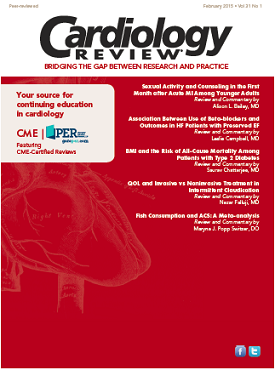Publication
Article
Cardiology Review® Online
Disasters Can Keep on Taking: Katrina Still Causing Heart Attack Spike
Author(s):
It was no surprise that New Orleans' Hurricane Katrina took an immediate toll on residents' health when it hit 11 years ago. A new study showed it also led (or forced) many people to stop taking care of themselves, resulting in an increase in heart attacks seen 10 years out.
Disasters take an immediate toll on their victims' health. Some people never get better.
A new study presented today at the American Heart Association's Scientific Sessions 2016 in New Orleans, LA found heart attacks attributed to Katrina were still spiking 10 years after the storm.
In the two years before the storm, the percent of people admitted to Tulane University Health Sciences Center in New Orleans for acute myocardial infarction was 0.7%. Over the 10 years since, that percentage rose to 2.8%.
Anand Irimpen, MD, chief of cardiology at Tulane Heart and Vascular Institute, and colleagues conducted the study of what he informally called “Post-Katrina Stress Syndrome”.
"We saw a three-fold increase in myocardial infarction, Irimpen said. He believes the answer as to why that happened is in other health indicators found in the study.
[Editor's note: Read Dr. Irimpen's personal account of surviving Katrina here. ]
The post-Katrina group had a higher prevalence of known coronary artery disease (47.9% vs. 30.7%) diabetes (39.9% vs. 28.7%) hypertension (80.6% vs. 74%) hyperlipidemia (59.3% vs 45.%,) smoking (53.8% vs 39.3%) drug abuse (16.4% vs. 6.7%) and psychiatric problems (14.9% vs. 30.7%).
Some of the shifts in the prevalence of these conditions could be due to changes in where they got care. The hurricane forced the closure of the city's Charity Hospital and its VA medical center, leaving more patients likely to get care at Tulane, which remained open.
That shift could explain why the rate of uninsured patients at Tulane rose during the period and were significantly more likely to be unemployed (17.5% vs. 2% before Katrina).
But the researchers believe the storm is the key reason people neglected their health and are still having heart and other problems as a result.
"They had other priorities than their health," he said, "they were trying to rebuild their homes," and get their lives back in order.
Unable to find care or pharmacies, many residents stopped taking medications for chronic conditions like diabetes, or high cholesterol, Irimpen said. They stopped worrying about diet, and adopted stress-related behaviors like smoking and substance abuse.
Those factors all likely contributed to the increase in heart attacks, he said.
The lesson for future disaster preparedness is to plan for "mobile clinics, mobile pharmacies, even mobile fitness centers," he said. Though people realize they can get exercise by walking, it just isn't the same as a gym routine, he said, and some people started getting out of shape.
The heart attack phenomenon was brought to his attention by cardiology fellows he was supervising who told him they were certain they were seeing more heart attacks.
Since he first spoke about the study, he also heard from physician researchers who documented a similar phenomenon in New Jersey after Superstorm Sandy, particularly an increase in heart attacks.
"They told us they were seeing the same things," he said.
